Running an agency means keeping one eye on today’s client work and the other on tomorrow’s opportunities. Most project management tools handle the first part well. They leave you scrambling, though, when it comes to winning new business.
The right software should take pressure off your team. In this guide, we’ll cover a range of options for your agency. Some are built purely for task and workflow management, others double as creative collaboration spaces or flexible work organisers.
And then there’s one that goes further, helping you manage both client delivery and the sales work that keeps an agency growing.
What to look for in agency project management software
Agency work moves fast, but not always in a straight line. Deadlines shift, client needs expand, and sales conversations happen alongside live projects. The right software keeps these moving parts connected with:
#1 Sales and delivery in the same place
If your pipeline lives in one system and your client work in another, there’s a gap where information and revenue can slip away. Closing that gap means better handovers from pitch to production and fewer moments where someone says, ‘I thought we’d agreed on…’
#2 Control over resourcing
One overbooked designer or an unavailable developer can stall an entire project. The right tool makes workloads visible so you can rebalance before missed deadlines become costly. Structured project management pays off here: agencies using task and deadline tracking see 38% more projects meet their original goals. That's a sign that clarity drives results.
#3 Collaboration that fits client expectations
Clients don’t always follow your internal process, but they still expect visibility. Look for tools that let them check progress, approve work, and leave feedback without endless email trails.
#4 Actionable reporting
Data is most valuable when it explains the story behind the numbers. And a dashboard is only useful if it shows where you’re losing time or money.
The best reporting digs into which accounts slow things down and where margins erode. That level of clarity makes prioritisation sharper, and sharper priorities can boost efficiency by up to 1.4×.
#5 Room to adapt
Agencies grow unevenly: a big client win here, a sudden pivot there. The software should handle those shifts without forcing you into a painful migration or breaking the tools you already use to invoice, schedule, or communicate.
Best agency project management tools
Capsule CRM
What if your project management tool also handled your sales pipeline, so you could move from a signed deal to project delivery without switching between multiple platforms?
Capsule does exactly that.
It’s the only option in this list that combines a full-featured CRM with built-in project management, giving you one space to track client relationships and deliver work.
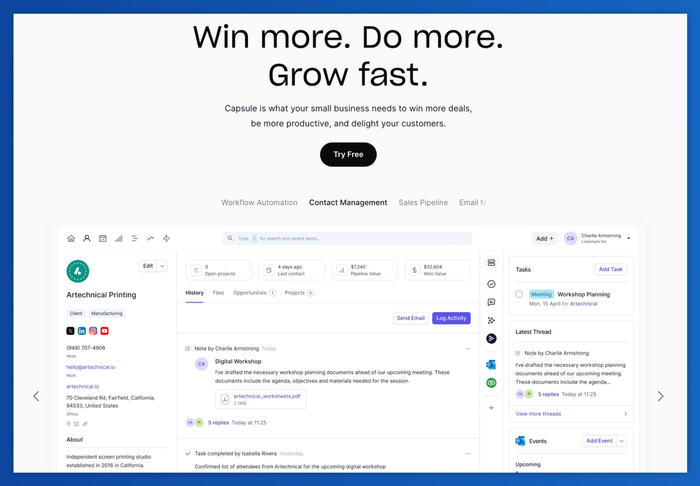
Key features for effective agency project management
Tracks
For work that repeats, like onboarding a new client or preparing a campaign launch, Tracks puts all yourbundle the right tasks together in the right order.
You don’t have to remember the checklist; it’s already built in.
You can use it for:
- creating a new client onboarding workflow with all the necessary calls and documents,
- coordinating multi-channel marketing campaigns with pre-scheduled steps for each platform,
- preparing end-of-project wrap-ups, including final reports or invoicing,
and many more tasks.
Project boards
A clear view of every job in progress. Each project sits on a visual board you can tweak to match how your team actually works. Need a 'Waiting on client' column? Add it. Want to drag a task from 'In progress' to 'Complete' the moment it’s done? Just move it.
You can spot bottlenecks as soon as they appear and keep jobs moving.
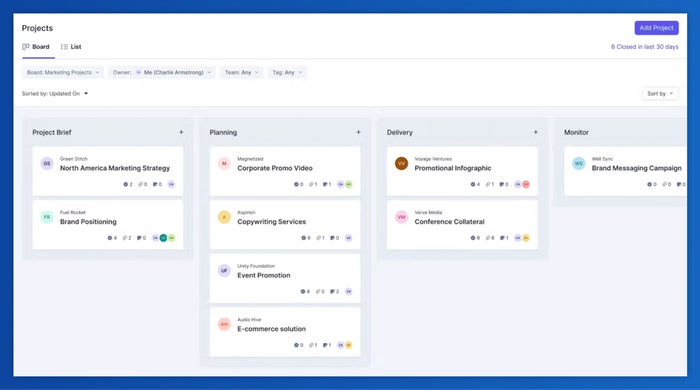
Project visibility
Boards tell you what’s happening. Visibility tells you why. Open a project in Capsule, and you’re looking at the whole backstory: the signed proposal or the email where the deadline changed. When a client rings, you’ve got the context to give them a straight answer, right there on the spot.
This joined-up view means anyone on the team can respond quickly and accurately, even if they haven’t been directly involved in the project until now.
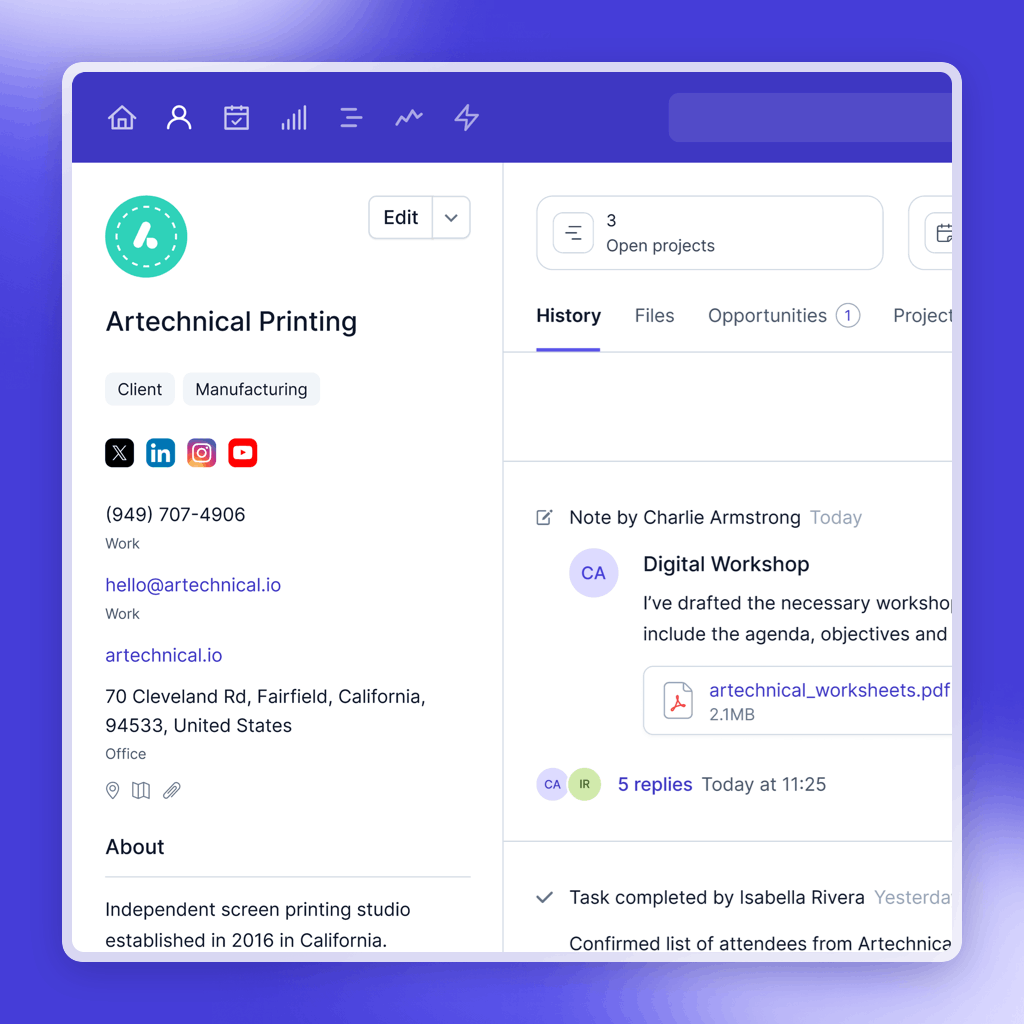
Process definition
In many agencies and service-based teams, a project will pass through half a dozen people before it’s done: from sales to delivery to client support. Without a clear process, things get missed, duplicated, or delayed.
Capsule lets you lay out the exact steps for each type of job so everyone knows what’s next. If someone’s off sick or leaves mid-project, their replacement can jump in without having to guess what’s already been done.
Integrations
Capsule plays nicely with dozens of tools agencies and professional teams already depend on.
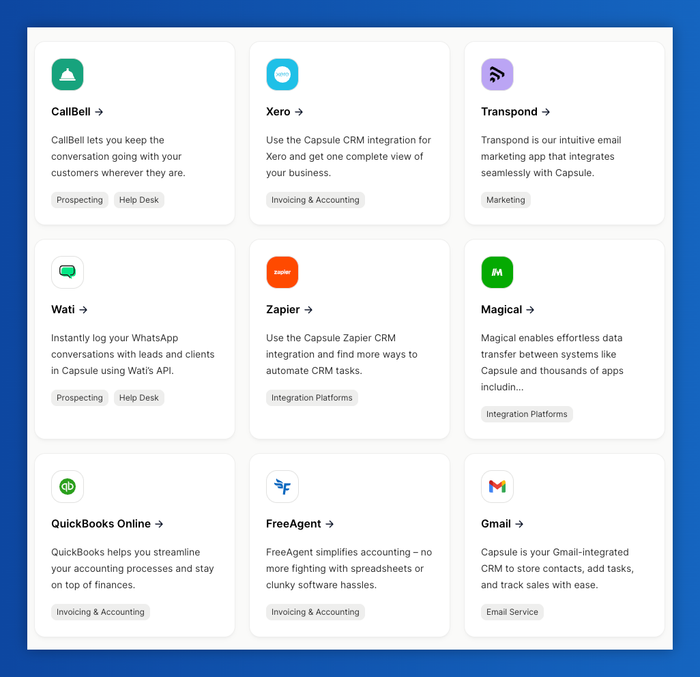
You can, for example,:
- link it to Google Workspace to pull in calendars, files, documents, or client emails;
- connect Microsoft 365 for shared documents and scheduling;
- send campaigns through Mailchimp or Transpond;
- link accounting platforms like Xero and QuickBooks to handle billing without retyping client details.
There are also integrations with project add-ons, marketing platforms, and form builders, so Capsule can sit at the centre of your tech stack instead of becoming another silo.
Pricing
Capsule starts at $18 per user each month, billed annually. There’s a free CRM plan for up to 250 contacts, which is enough to trial the platform with real clients before committing.
All paid tiers include both CRM and project management features, so you don’t pay extra to unlock the 'delivery' side of the tool. Every plan comes with a free trial, giving you time to see how it fits alongside the rest of your workflow.
Reviews speak for themselves
(sources: G2)
Professionals using Capsule often point to its adaptability. One reviewer, who runs multiple businesses, said it’s 'intuitive' and 'flexible to set up,' adding that they’ve relied on it for more than a decade without downtime.

Another moved to Capsule after testing several different tools and found the transition 'very easy.' They valued being able to tailor it with custom fields and data tags, and highlighted how Tracks simplified task allocation and distribution.

For those exploring options, the free version is a popular starting point. One consultant described the 'magic' of Capsule’s project boards for managing delivery teams, recruitment, and training – with the added benefit of excellent support, even on the free plan.

A long-time user called it 'the perfect CRM to start and scale with,' praising the quick onboarding and responsive human support.

For teams relying on multiple apps, integration stood out. One review noted that Capsule works perfectly with their sales pipeline and marketing tools, creating an automation process where 'nothing is missed.'

Others emphasise its simplicity. 'Super easy, love it,' wrote one reviewer, recommending it for start-ups and scaling businesses because of its straightforward setup and daily usability.

Asana
Asana is what happens when sticky notes, spreadsheets, and endless email chains finally retire.
It offers a single place to keep the project schedule and line up project goals without losing sight of the details.
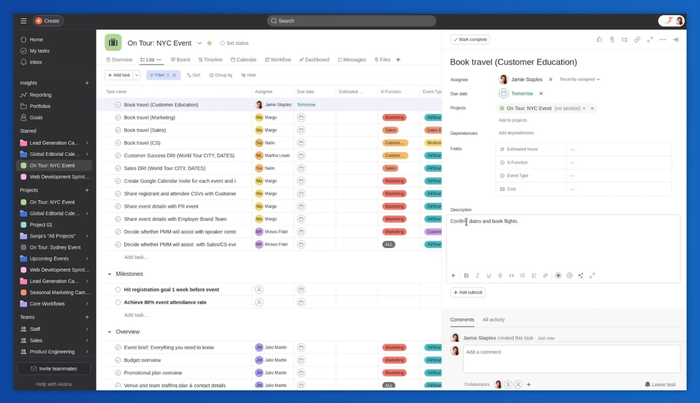
Asana thrives on structure but won’t box you into one project management methodology. Just don’t expect it to double as a CRM; your sales team will still need somewhere else to store their client communicationsto live.
3 key features
- Multiple views (boards, timelines, and lists) so creative teams, account managers, strategists, or designers can work together how they prefer.
- Capacity planning and workload dashboards to show who’s overloaded and who’s available for easier resource allocation.
- Rules and templates that automate repetitive task setups, keeping the project management process consistent.
Pros for agencies
- Adapts to different project management styles without forcing one rigid approach.
- Integrates with creative agency staples like Slack, Google Drive, and Adobe Creative Cloud.
- Reporting tools make it easier to connect day-to-day work with broader project goals.
- Clear interface helps onboard new team members quickly and keeps clients informed.
Cons for agencies
- No built-in CRM or sales pipelines.
- Time tracking is limited unless you add an integration.
- Large agencies may need strict processes to avoid clutter as projects multiply.
- Some advanced features sit behind advanced plans.
Best for
Agencies that want a flexible project management framework with strong task management but already have a separate CRM.
Pricing
Free plan available; paid plans start at $10.99/user/month.
Trello
If your agency runs on sticky notes and coffee-fuelled morning huddles, Trello is like giving those ideas a digital wall where everything sticks. Its card-and-board system helps agency project managers get campaign timelines and progress tracking into view in seconds.
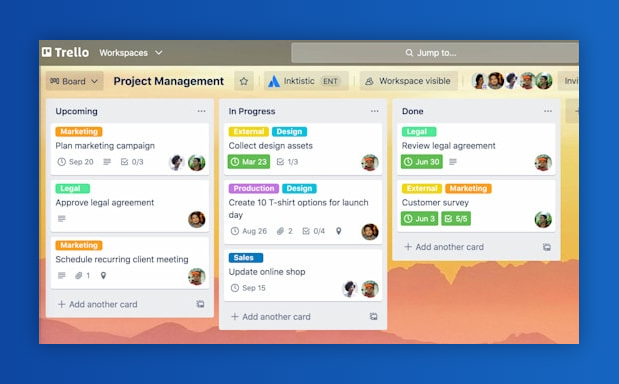
Just don’t expect Trello to turn into your sales management software. Your BDRs will still need another tool for their work.
3 key features
- Drag-and-drop boards and cards for organising everything from ad concepts to campaign assets.
- Calendar view and automation to keep project schedules on track without manual updates.
- Power-Ups and integrations with agency tools to extend functionality.
Pros for agencies
- Fast onboarding: even new hires can use it confidently within minutes.
- Great for visually organising creative tasks and smaller agency projects.
- Integrations with cold email software, embedded analytics platforms, or AI coding assistants make it easy to connect Trello with existing agency workflows.
- Affordable pricing with a generous free plan.
Cons for agencies
- Lacks resource management and project budgeting for complex work.
- Boards can become cluttered without clear agency processes.
- Many advanced features require paid Power-Ups.
- No client management capabilities.
Best for
Advertising and marketing agencies that want an intuitive, visual system for managing tasks.
Pricing
Free plan available; paid plans start at $5/user/month.
Monday.com
If your agency projects feel like puzzles where the edges change mid-build, Monday.com gives you the freedom to redraw the boundaries.
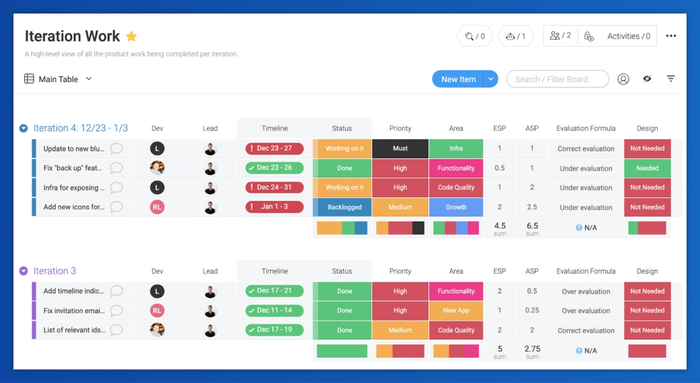
It’s a modular work operating system that bends to your agency’s project management process, whether you’re plotting campaigns or taking care of financial management.
3 key features
- Fully customisable boards with views like Kanban or Gantt that adapt to evolving project schedules.
- Dashboards with workload and timeline widgets to keep team dynamics and deadlines front and centre.
- Prebuilt templates for campaigns to speed up setup.
Pros for agencies
- Workflows that align with your agency’s style.
- Dashboard views for quick visibility into project budgets, team workloads, and project progress.
- Automations and shared boards that reduce repetitive check-ins and speed up onboarding.
- Scales well for both boutique and enterprise agency settings.
Cons for agencies
- Feature depth can overwhelm smaller teams new to structured project management.
- More advanced analytics and reporting require higher-tier Monday plans.
- Doesn’t cover CRM needs for business development or client pipelines.
- Customisation can feel like overkill if you only need a simple setup.
Best for
Digital marketing agencies that want to shape a platform around their project goals instead of fitting their work into a rigid template.
Pricing
Free plan available; paid plans start at around $9–$12/user/month depending on features.
Basecamp
Basecamp proves you don’t need to stumble upon a steep learning curve to run successful project management operations. It swaps complex frameworks for a clean, approachable space where conversations and files live side by side.
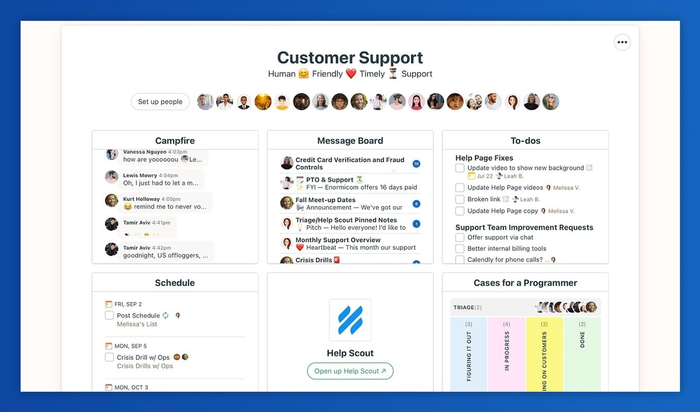
For a small creative studio or a busy advertising agency, it’s the kind of tool that keeps everyone gathered around the same fire.
3 key features
- To-do lists, message boards, schedules, and an 'applause' button to celebrate wins.
- Automatic check-ins that replace some status meetings with quick written updates.
- File storage and and group chat called 'campfires' in one shared space.
Pros for agencies
- Quick to adopt; most teams feel comfortable after the first login.
- Clear visibility into project schedules and deliverables.
- Keeps all agency communication tied to the relevant project.
- Supports smooth client onboarding with message boards and progress updates.
Cons for agencies
- No built-in customer feedback tools, solutions for allocating resources or managing project budgets.
- Not a CRM, so sales pipelines live elsewhere.
- Lacks features for large, multi-phase projects with complex dependencies.
- Reporting is basic compared to more advanced tools.
Best for
Agencies that want a centralised platform for communication and task tracking without the complexity of traditional project management software.
Pricing
Flat rate of $15/user/month; no per-feature add-ons.
Teamwork
While some tools help you tick off tasks, Teamwork gives you the full picture: from project plans through budgets to who’s free for the next brief.
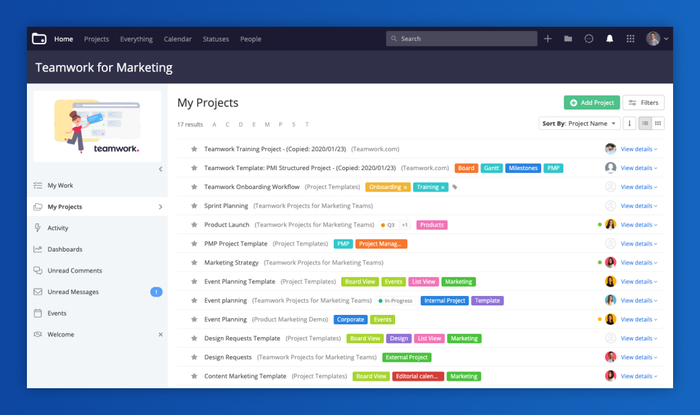
In a busy agency setting, it’s the difference between managing projects and actually running the business side of them.
3 key features
- Detailed resource planning and real-time workload views give you 20/20 visibility before you commit to future projects.
- Time tracking and billing are embedded inside project plans, so every hour translates into profitability.
- Client portals and access settings let external stakeholders see progress and share feedback without email taggingtag.
Pros for agencies
- Puts a spotlight on financial health and project success from start to finish.
- Helps project managers balance team workloads and reduce burnout.
- Fairly generous free tier makes testing with real agency projects painless.
- Trusted by thousands of agencies for keeping client workflows trackable.
Cons for agencies
- Interface can feel dense when you’re only juggling small, one-off creative tasks.
- Advanced analytics and AI forecasting require higher-tier plans.
- Still not a CRM; client teams will need another tool to own that pipeline.
- Extra complexity may feel overwhelming if you don’t need financial or resource layers.
Best for
Marketing agencies that want an agency-ready platform to manage project flow allocation under one roof.
Pricing
Free tier available; paid tiers start at $10.99/user/month for the 'Deliver' package, rising to $19.99/user/month for the 'Grow' tier with reporting and budgeting tools.
FunctionFox
FunctionFox focuses on helping agencies bring order to client projects while keeping a close eye on billable time.
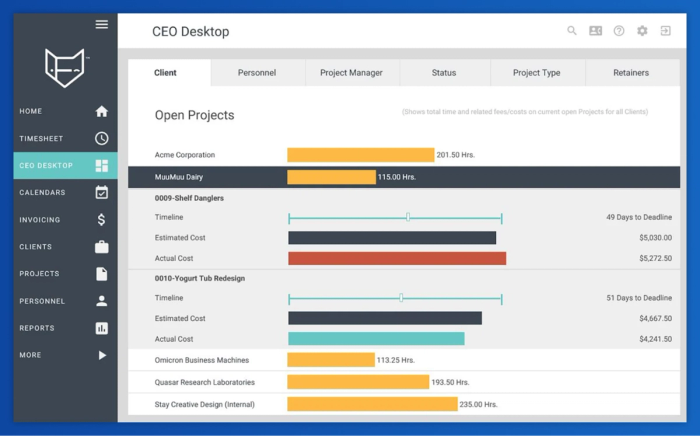
3 key features
- A stopwatch timer that logs every minute on real client projects and tasks.
- A project calendar that turns chaotic deadlines into a visual schedule for every team member.
- Dashboards that let you spot budget creep before it sneaks into your forecasts.
Pros for agencies
- For a design sprint or a full campaign, you can quote future projects down to the minute.
- Your agency team knows instantly who’s free, who’s booked, and who’s falling behind – perfect for resource-sensitive creative workflows.
- Clients love transparency. When they ask 'Where do we stand?', you can give them a data-backed answer.
Cons for agencies
- The interface isn’t user-friendly.
- Collaboration features beyond time tracking (like threaded feedback or shared whiteboards) feel outdated.
- It doesn’t morph into a CRM, so your sales team will still need a separate tool to manage leads.
- Non-billable, internal, or exploratory work? You’ll need workarounds to keep those just as visible.
Best for
Creative teams that bill by the hour and want a project management tool that tracks time and budget without extra friction.
Pricing
From $5 to $20/user/month.
Kitchen.co
Kitchen.co is built for marketing firms that need one place for client communication, file sharing, task coordination, billing, and deliverables.
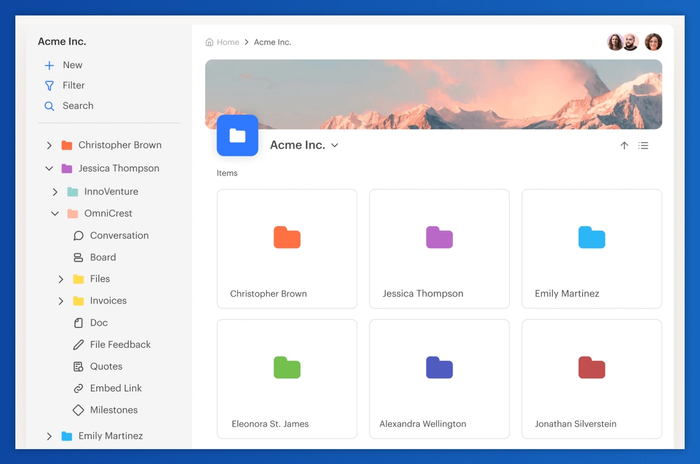
It acts like your client-facing project cockpit, combining transparency and branding so your agency team and clients stay aligned.
3 key features
- Nested folders and color coding for organizing client projects with clarity and precision.
- Conversations that sync with email, letting clients reply without logging in, and keeping messages in the right context
- Built-in invoices and payments, plus secure file sharing, so you can bill and deliver within the same interface.
Pros for agencies
- Combines project management and a branded client portal, creating a unified experience for agency teams and their clients.
- A highly visual workspace with boards and folders is easy to navigate.
- Features like real-time messaging and shared spaces reduce email clutter and speed up decision-making.
- White-label options let agencies reinforce their brand.
Cons for agencies
- Time tracking is still missing, so tracking creative projects by hours requires workarounds.
- Compared to full PM platforms, project budgeting or resource planning lack more advanced features.
- Designed for collaboration and delivery, not for managing pipelines or lead nurturing, so CRM gaps remain.
Best for
Agencies that need a polished client portal that also doubles as a lightweight project management dashboard, especially when client satisfaction and branded delivery matter.
Pricing
Free for small teams. Paid plans start around $29/month for agencies.
Planable
If your agency’s content workflow looks like a crime scene, with feedback buried in email threads and filenames like final_FINAL_v3_reallythisone, Planable is the cleanup tool you’ve been waiting for.
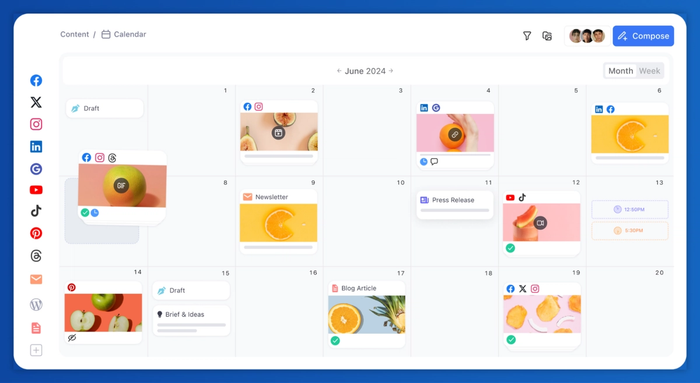
It’s a single, spotless space where you can create, review, approve, schedule, and analyse every piece of content, from Instagram reels to client newsletters.
3 key features
- Dedicated workspaces for each client so campaigns don’t bleed into each other.
- Drag-and-drop calendar that shows your entire content plan at a glance.
- Live collaboration with comments and multi-level approvals.
Pros for agencies
- Cuts client approval time in half with visual previews and clear approval steps.
- Removed the chaos of scattered feedback across various marketing channels.
- Handles all major formats (social posts, blogs, newsletters, press releases) without you switching tools.
- Publishes directly to major social platforms, complete with built-in analytics.
Cons for agencies
- Won’t manage your ad spend or targeting, so you’ll still need your ads manager for that.
- Needs a little setup to nail roles and workflows before it hums.
- Analytics lean heavily toward social performance, not other channels.
- It’s not an agency CRM.
Best for
Agencies and in-house marketing teams ready to stop chasing feedback and start running all their content in one central hub.
Pricing
Starts at $33/workspace/month. Free plan available for up to 50 posts.
Unbounce
Unbounce enables agencies to craft high-converting marketing campaigns for clients with landing page builder and CRO tools that save time and maximize ROI.
Key features:
- drag-and-drop builder for fast landing page creation without needing a developer
- A/B testing and Smart Traffic for optimized conversion rates.
- Hundreds of conversion-optimized templates
- Support integrations with agencies' existing tool stack
- Manage multiple clients effortlessly from a single account, and easily replicate successful assets to apply across different clients
- Flexible permissions for team and client collaboration on projects.
- Mobile-responsive design tools for consistent cross-device experiences.
- Dynamic Text Replacement for personalized visitor experiences.
- Agency partner program help agencies earn commision
Best for
Agencies and marketers across different industries including e-commerce, SaaS and B2B
Pricing
Unbounce plans start at $99/month for Build (or $74/month billed annually), with Experiment at $149(o$112/month billed annually), Optimize at $249(or $187/month billed annually), and custom Agency pricing options. They also offer a 14-day free trial.
Over to you
Most of the tools in this roundup are great at helping a project manager keep work moving, but they might fall short when it comes to tracking sales. That’s where Capsule stands out. It blends CRM capabilities with project management features so your agency’s project management practices aren’t split across two or three platforms.
With Capsule, you can move a client seamlessly from lead to pitch, signed contract to project delivery – all while managing the project scope and tracking progress in one place.
The impact is clear: less tool-hopping and more visibility of project performance. For agencies that want to manage projects and relationships with equal precision, Capsule gives you a single, connected workflow from first hello to final deliverable.
If you’re ready to streamline how you win and deliver client work, explore Capsule today and see how it can work towards your team's efficiency.
Frequently Asked Questions
Agency management software is a central platform that helps an agency project manager oversee client work and manage the business side of an agency. It brings together various features, such as task tracking, boards, project timelines, analytics, or reporting, so agency owners can manage and distribute resources efficiently.
Agency project management is the process of coordinating a project team to deliver client work on time and within scope. It involves setting project objectives, fine-tuning them, monitoring the project budget, and delivering work with agreed project timelines. Strong agency project management also factors in both creative output and client expectations.
Agencies use a mix of tools for communication, analytics, scheduling, and reporting. Many platforms help manage financial resources and give agency owners a single view of everything happening across accounts. Popular choices also include features for task assignment and keeping everyone on the same page.
The best software depends on the type of work and team size. For many agencies, the right tool will combine planning features like Gantt charts with the ability to establish clear processes and focus on delivering quality work at scale.
Most project management tools fall into three categories: task-based platforms that help you define objectives and track progress, collaborative tools that support effective client onboarding and feedback, and specialist solutions for ad agencies with industry-specific workflows.
To run complex projects smoothly, start by mapping out every phase and role. Use structured timelines, transparent task allocation, clear scope, and real-time communication tools to prevent bottlenecks. Make sure dependencies are tracked, and updates are visible to the whole team – this is what keeps even the largest projects moving without surprises.




